Kindle Cookie Factory
 |
| In the heart of Vinita, Oklahoma,
during the hard years of the Depression, the sweet smell of cookies
began drifting down North Scraper Street. It was 1935 when Julian
Ball, a baker from Tennessee with a knack for business, opened
the Ball Cookie Company. Ball had already spent four years
running a similar venture in Tulsa, and now he was ready to bring
his cookies to Vinita. |
| By late 1938, the Craig County
Democrat was advertising his treats: three pounds of broken
cookies for just twenty-five cents, or a dozen perfect cookies for
fifty cents. In the days when every penny counted, those bags of
cookies quickly became a household favorite. |
| But business is rarely as steady
as the ovens. By 1939, the company had a new proprietor: W. L.
Kinder, an enterprising man from Oklahoma City. Under his
management, the bakery continued to supply cookies to Vinita and
beyond. |
| Not all the company’s news was
sweet. In 1940, former salesman Bob Seedore was arrested in Texas
for embezzling $106 from the company. His trial in Vinita made
headlines, and he was sentenced to a year in the state penitentiary. |
| Meanwhile, tragedy struck the
Kinder family itself. Clyde F. Kinder, brother of W. L., was
killed in a terrible collision with a gasoline truck. Clyde had been
managing the Kinder Cookie Company in Oklahoma City, and his sudden
death was a loss both to the family and the business. |
| Even with setbacks, the ovens kept
turning out cookies. By 1943, the company had taken on a new name—Jack’s
Cookies and even bigger ambitions. That year, they purchased a
state-of-the-art tunnel oven, fifty-four feet long with a 104-foot
cooling system. At an open house in 1944, they proudly showed off
their new capacity: two tons of cookies a day. From Vinita, their
products began spreading across the Southwest, with a lineup that
included vanilla wafers, oatmeal cookies, sugar cookies, coconut
bars, Dutch cookies, and lunch cakes. |
| The war years gave their cookies
an even wider reach. Through a contract with a food distributor in
Amarillo, Jack’s Cookie Company sent regular shipments to military
training camps in West Texas. Servicemen far from home found comfort
in the familiar sweetness of Vinita-baked cookies. |
| By 1949, what had begun as a
Depression-era bakery was now a thriving enterprise. Eleven
employees worked five days a week, producing about 1,200 sacks of
cookies each day. Vanilla wafers were the star of the show, but fig
bars, oatmeal cookies, and lunch cakes held their own. The ovens
devoured nearly 100 sacks of flour a week to keep up with demand. |
| Outside the factory walls, W.
L. Kinder revealed another side of himself—not as a baker, but
as a stargazer. At his home on North Brewer Street, he built his own
telescope, grinding the massive 12½-inch lens by hand. With a focal
length of nearly twelve feet, it was one of the most powerful
privately made telescopes in Oklahoma. Boy Scouts, school groups,
and curious townspeople came to peer into the heavens through
Kinder’s handmade creation, just as they had once gathered for
cookies on North Scraper Street. |
| It came time for another owner,
the Luginbuel men, Reid, Jeff and Jack had purchased the cookie
factory. The factory is on land adjacent to the Luginbuel Funeral
Home. |
| From its humble beginnings under
Julian Ball to its expansion under the Kinder family, then the
Luginbuels’ Vinita cookie company became more than a business. It
was a story of resilience, community, and ambition—a tale as rich as
the cookies that came out of its ovens. |
CEF1025AI